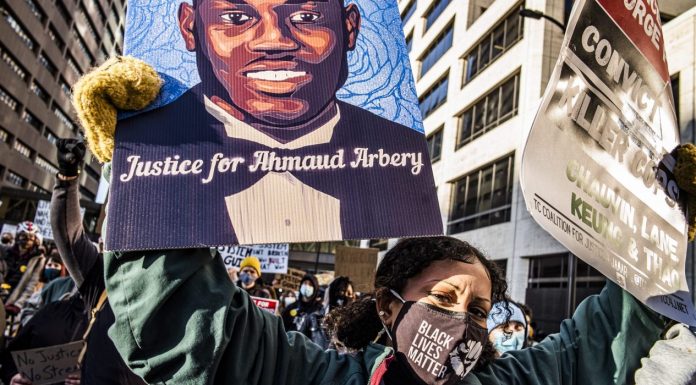(Headline USA) Attorneys in the trial of Derek Chauvin—the former Minneapolis police officer charged in George Floyd’s death—questioned potential jurors Wednesday about their attitudes toward police.
The selection process largely hinged on whether would-be jurors were more inclined to believe testimony from law enforcement or evidence from other witnesses to the fatal confrontation.
Judge Peter Cahill seated two more jurors to go with the three picked Tuesday for Chauvin’s trial on second-degree murder and manslaughter charges.
Attorneys asked prospective jurors one by one whether they could keep an open mind, what they think of the criminal justice system and racial justice issues, how they resolve conflicts and more.
In a separate development, the Minnesota Supreme Court declined to hear Chauvin’s appeal to block a third-degree murder charge from being reinstated.
At issue was whether the conviction of another former Minneapolis police officer in the killing of an Australian woman established a precedent for prosecutors to restore a third-degree murder count that the trial judge dismissed earlier.
The Minnesota Court of Appeals last week said it settled the law with its ruling last month affirming the conviction of Mohamed Noor in the 2017 shooting death of Justine Ruszczyk Damond.
The new decision from the state’s highest court left open the possibility that Cahill could add the charge back, lessening the chances that Chauvin’s trial would be delayed over the dispute. Legal experts say giving the jury another option for convicting Chauvin of murder raises the chance of a conviction.
Cahill noted the ruling during a break and told the prosecution and defense that they’ll discuss next steps Thursday morning before jury selection begins. He noted that there are still some legal issues to be decided before resolving that dispute.
The first juror picked Wednesday, a man who works in sales management and grew up in a mostly white part of central Minnesota, acknowledged saying on his written questionnaire that he had a “very favorable” opinion of the Black Lives Matter movement and a “somewhat unfavorable” impression of the Blue Lives Matter countermovement.
Although he “somewhat agreed” that police don’t get the respect they deserve, he said he agrees that there are bad police officers.
“Are there good ones? Yes. So I don’t think it’s right to completely blame the entire organization,” he told the court under questioning from prosecutor Steve Schleicher.
He also said he would be more inclined to believe an officer, all things being equal, over the word of another witness. But he maintained he would be able to set aside any ideas about the inherent honesty of an officer and evaluate each witness on their own.
The second, a man who works in information technology security, marked “strongly agree” on a question about whether he believes police in his community make him feel safe. His community wasn’t specified—jurors are being drawn from all over Hennepin County, which includes Minneapolis and many of its suburbs.
“In my community, I think when there is suspicious activity the police will stop by, they will ask a question,” he said. “I think that sense of community is all we want right? We want to live in a community where we feel safe regardless of race, color and gender.”
Schleicher noted that the man also said in his questionnaire that he strongly disagreed with the concept of “defunding” the police, which has become a political flashpoint locally and across the country in the wake of Floyd’s death.
“While I necessarily might not agree with the police action in some situation, I believe that in order for police to make my community safe they have to have the money,” he replied.
The questionnaire explores potential jurors’ familiarity with the case and their own contacts with police. Their answers have not been made public, and the jurors’ identities are being kept secret. Their racial backgrounds often aren’t disclosed in open court.
Floyd was declared dead on May 25 after Chauvin, who is white, pressed his knee against the black man’s neck for about nine minutes while attempting to restrain him.
Subsequent reports have indicated, however that Floyd may have been overdosing on fentanyl or other narcotics at the time, and that Chauvin’s efforts to restrain him may have been intended to prevent self harm.
After video of Floyd’s death went viral, it sparked violent protests in Minneapolis and beyond, leading to growing influence of the Black Lives Matter movement, as well as the pro-anarchist Antifa.
The outrage also helped trigger a wave of cancel-culture that some have characterized as a national “reckoning” on race.
Chauvin and three other officers were fired. The others face an August trial on aiding and abetting charges. The defense hasn’t said whether Chauvin will testify in his own defense.
Schleicher used a peremptory challenge Wednesday to remove from the panel a woman who has a nephew who’s a sheriff’s deputy in western Minnesota. She said she was dismayed by the violence that followed Floyd’s death.
“I personally didn’t see any usefulness to it,” she said. “I didn’t see anything accomplished by it, except I suppose bring attention to the frustrations of the people involved. But did I see anything useful coming out of the burning of Lake Street and that sort of thing? I did not.”
The first juror chosen for the panel on Wednesday said he had one potential problem—he’s scheduled to get married May 1 in Florida but was prepared to change his plans if the trial continues that long.
Opening statements are scheduled for no sooner than March 29 and testimony is expected to last about four weeks, so it could get tight.
“We’ll do our best to get you to your wedding,” Cahill said as he informed the man he was on the jury. “Go ahead and throw me under the bus with your fiancée.”
Adapted from reporting by the Associated Press

